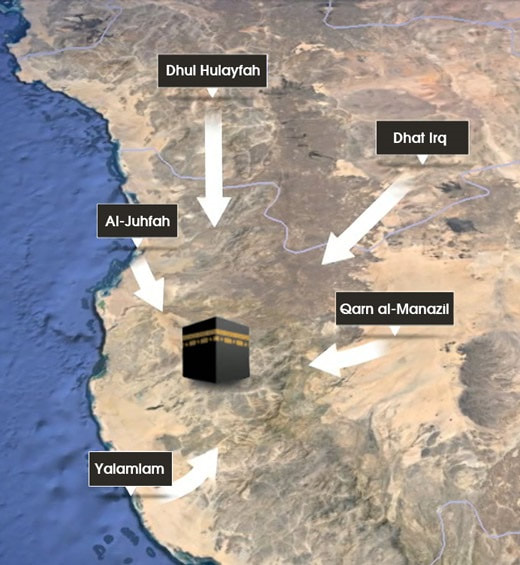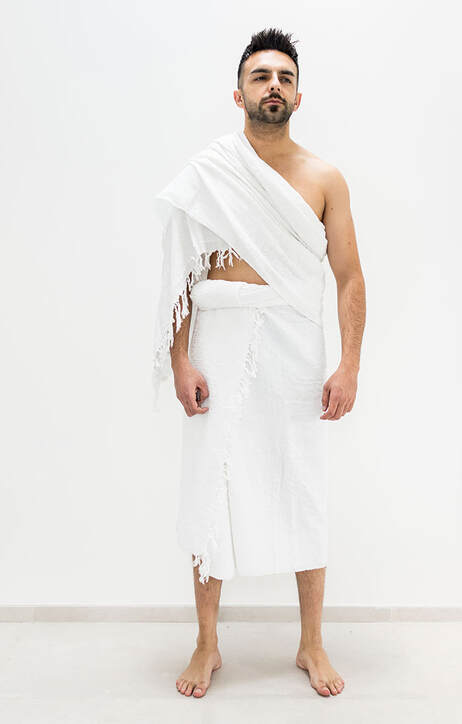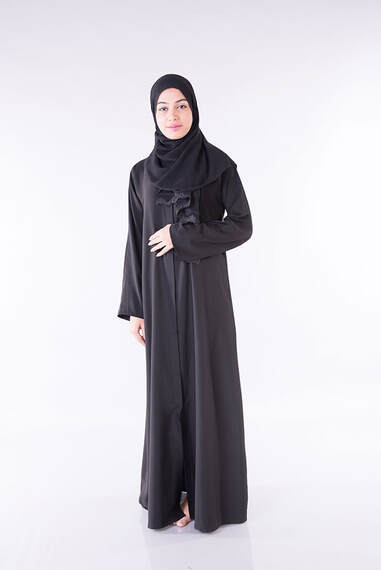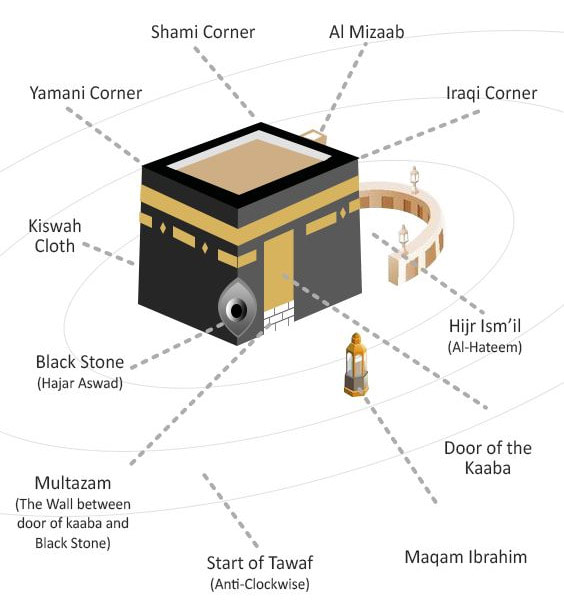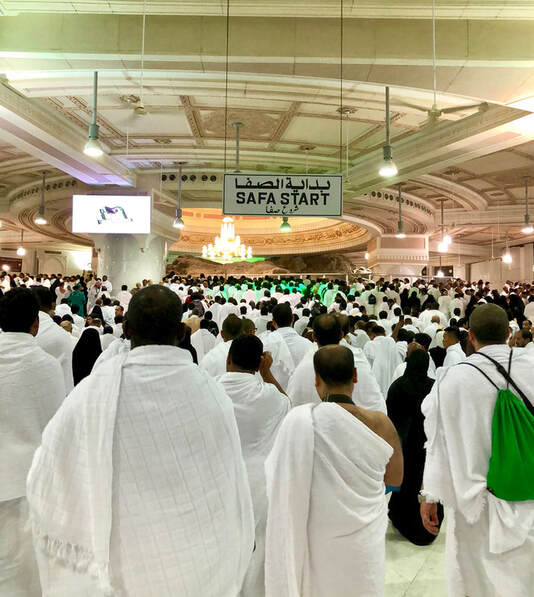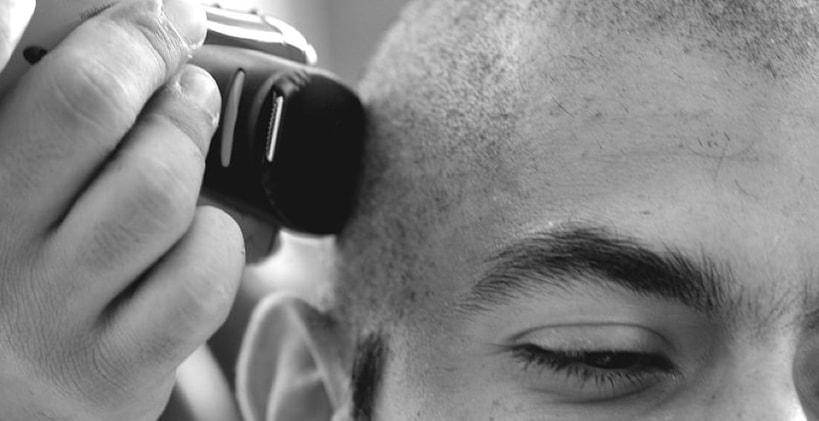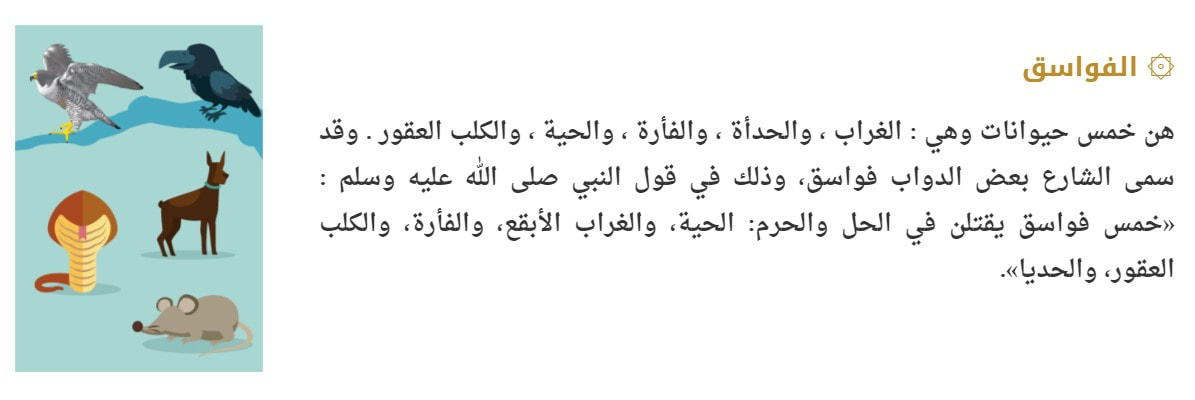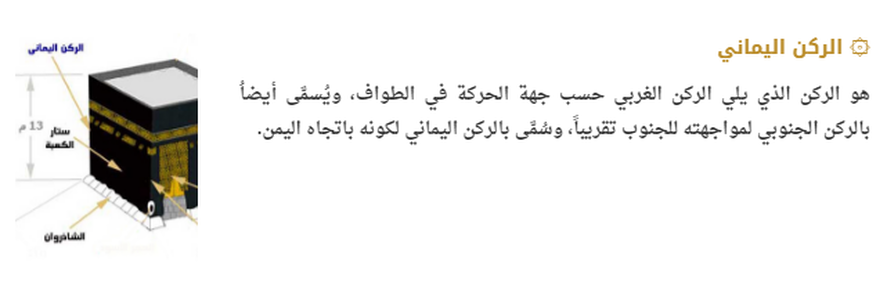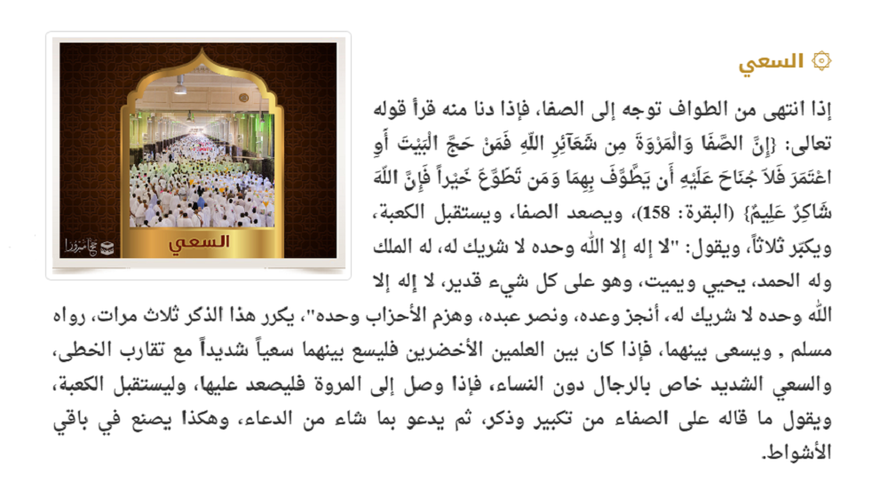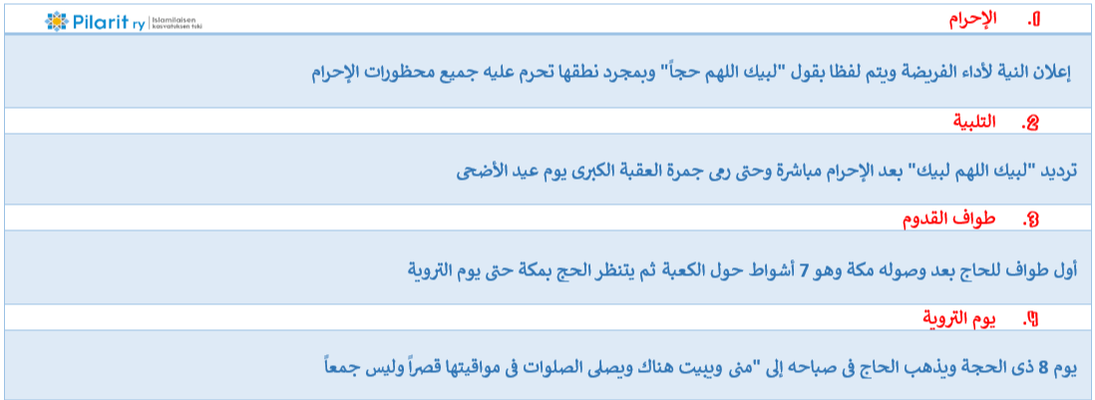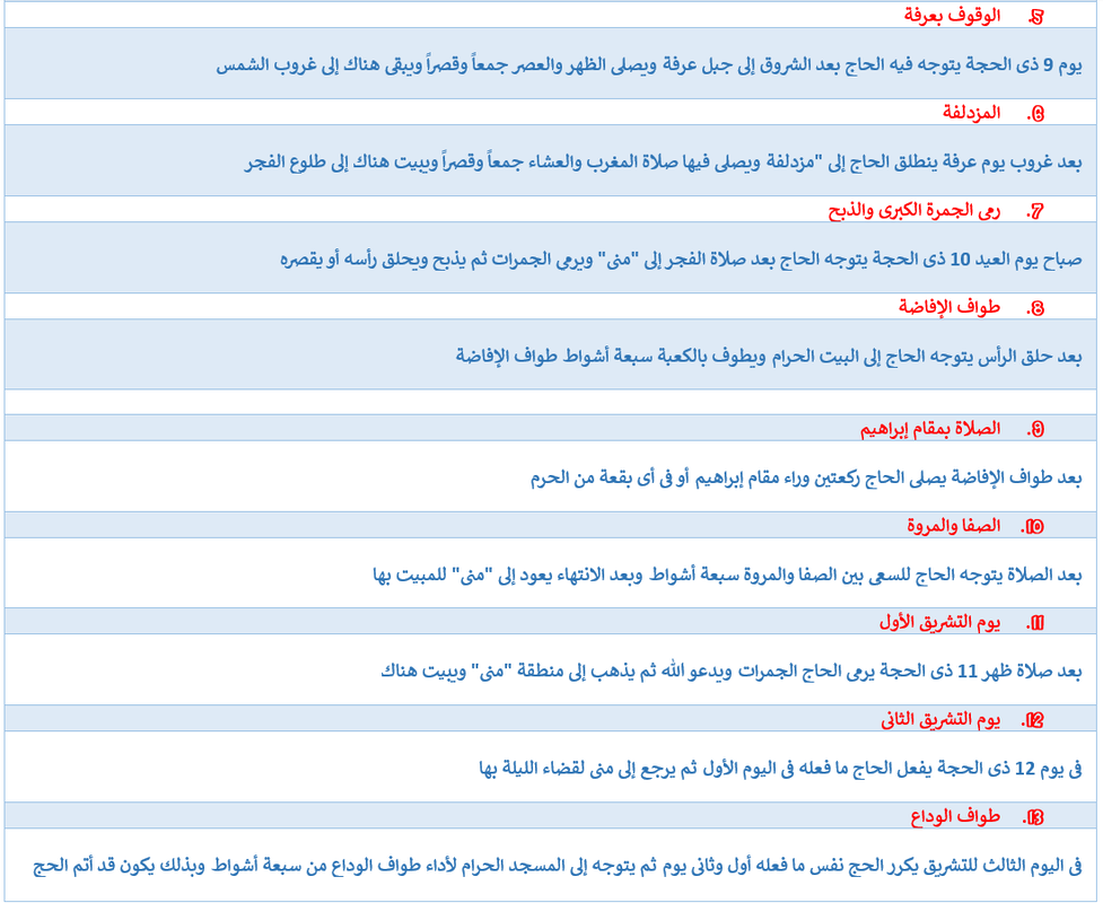Umra: Englanniksi
Courtesy of muslimcentral.com
1: General Definition
2: Meeqat
3: Ihraam
4: Tawaaf
5: Sa'i
6: Shaving
Umrah Video
1: General Definition
Definitions, Ruling, Virtues and Conditions for Umrah
Linguistically: To visit
Technically: Umrah is a way of worshipping Allah by making Tawaf of the Kabah and Sai between Mount Safa and Marwa and shaving or cutting the hair.
Technically: Umrah is a way of worshipping Allah by making Tawaf of the Kabah and Sai between Mount Safa and Marwa and shaving or cutting the hair.
Islamic Ruling on Umrah
It is obligatory at least once in a lifetime as found in this hadeeth.
It is obligatory at least once in a lifetime as found in this hadeeth.
Aishah said, O Messenger of Allaah, do women have to engage in jihad? He said, Yes, they must do jihad in which there is no fighting: Hajj and Umrah
Muhammad (ﷺ): Ibn Maajah (2901)
Muhammad (ﷺ): Ibn Maajah (2901)
Virtues of Umrah
Umrah is known to be the minor Hajj and is a Sunnah act performed at anytime of the year.
One Umrah is an expiation for the sins committed between it and another Umrah.
Muhammad (ﷺ): [Bukhari, Muslim]
Muhammad (ﷺ): [Bukhari, Muslim]
The above hadeeth implies that Umrah is not something we perform just once, but rather one should strive to perform Umrah multiple times in their lives.
Conditions for Umrah
- Islam
- Puberty
- Sanity
- Freedom
- Capability (physically & financially)
- Mahram companion for Women
Pillars of Umrah
- Ihraam (Intention to enter the state of Umrah)
- Tawaaf
- Sai
If one leaves a Pillar, he/she must return & make the missed pillar, if not, then his/her Umrah is invalidated.
Obligations of Umrah
- Ihraam at the Miqaat
- Shaving or Cutting the Hair
If one leaves an obligation a Fidyah (Compensation) is needed by sacrificing in Makkah, A sheep, or 1/7 of a Cow or 1/7 of a Camel and distributing it to the poor in Makkah.
2: Meeqat
2: MeeqatIn terms of Time
For Hajj: The months of Hajj
For Umrah: At any time of the year
For Umrah: At any time of the year
Those who live within the Radius of the Miqaat can make Ihraam from their homes.
People living in Makkah need to go out of the boundaries of Makkah to make Ihram.
As nowadays people come by flights from all parts of the world, they need should either get into Ihram before boarding the flight or just before flying over the Miqaat.
(There is an announcement made in Saudi Airlines before of approaching the Miqaat)..
People living in Makkah need to go out of the boundaries of Makkah to make Ihram.
As nowadays people come by flights from all parts of the world, they need should either get into Ihram before boarding the flight or just before flying over the Miqaat.
(There is an announcement made in Saudi Airlines before of approaching the Miqaat)..
Physical Locations
- Dhu'l-Hulayfah - This mīqāt is about 9 kilometres (5.6 mi) from Medinah and about 450 kilometres (280 mi) from Mecca. Dhu'l-Hulayfah is the mīqāt for those who live in Madinah and for those who approach Mecca from the direction of Medinah.
- Qarn ul-Manāzil - Also known as Mīqāt Al-Sail, located 85 kilometres (53 mi) from Mecca, in a small town known as As-Sail Al-Kabeer on Highway 40. This mīqāt serves pilgrims coming from the Najd region which is generally the middle of Saudi Arabia.
- Yalamlam - This mīqāt point serves the Hujajj coming from the direction of Yemen. Yalamlam is a small city in the province of Makkah.
- Juhfah - This mīqāt is about 190 kilometres (120 mi) to the northwest of Mecca. This is the mīqāt for the people who come from the direction of Ash-Shaam.
- Dhāt-i 'Irq - This mīqāt is about 85 kilometres (53 mi) northeast of Mecca. This mīqāt serves pilgrims coming from the direction of Iraq, Iran, and other places en route. The mīqāt is situated in a very rural location, 58 kilometres (36 mi) from Highway 40, the main Taif-Riyadh road.
3: Ihraam
Ihraam
Men
Men
Putting on the ihram garments, which are the rida’ and izaar (upper and lower garment) for men.
Two towels/sheets (preferably white), one wrapped around the lower part of the body and the other around the upper part of the body and wear sandals.
Ihraam
Women
Women
Women may wear whatever they want of permissible clothing.
Wearing the clothes she usually wears when leaving the house, except for gloves and niqaab (type of veil that reveals the eyes).
During Umrah a woman should (if possible) uncover her face if she is not in the presence of non-mahram men. But since in present times it is not possible as the Haram is always so full it is desirable that the sisters who think can attract men should cover their faces but not with niqaab rather make the scarf of the head to come on the face
Talbiyah
Talbiyah starts just after Ihraam. Begin with the intended act of worship by saying once:
Talbiyah starts just after Ihraam. Begin with the intended act of worship by saying once:
لَـبَّـيكَ ٱللّـهـمَّ بِعمرة
Labayk Allahumma Bi-Umrah
O Allah, here I am responding to you to make Umrah
If one fears that they are likely to be subjected to illness or anything else that might obstruct their Umrah, one may add the following, by doing so if one cannot complete the Umrah for whatever reason; then they simply cut their hair and do not have to pay the ransom.
اللَّهمَّ مَحِلّي حَيثُ حَبَستَني
Allaahumma mahillee haithu habastanee
I come out of the state of Ihraam from the place You prevent me from continuing
Then repeatedly say until you start Tawaaf:
لَبَّيْكَ اللَّهُمَّ لَبَّيْكَ ، لَبَّيْكَ لَا شَرِيكَ لَكَ لَبَّيْكَ ، إِنَّ
الْحَمْدَ والنِّعْمَةَ لَكَ وَالْمُلْكُ ، لَا شَرِيكَ لَكَ
Labbayk Allahumma labbayk, labbayka laa shareeka laka labbayk, innal-hamda wan-nimata laka wal-mulk, laa shareeka lak.
Here I am, O Allah, here I am. Here I am. You have no partner. Here I am. Surely all praise, grace and dominion is yours, and you have no partner
Restrictions
if violated that requires compensation (fidyah)
Men
- Wearing regular or any sewn clothes including shoes
- Covering the head (even with the Ihram cloth)
- Wearing gloves
- Wearing Niqab
- Men and Women
- Cutting plucking hair from any part of the body
- Clipping fingernails or toenails
- Putting perfume while in the state of Ihram.
- Sexual activity
- Sexual intercourse (requires Major Fidyah)
- Hunting/ catching animals (even for Non- muhrims while in the boundaries of haram) (requires Equal fidiyah)
- We are also restricted to make a Marriage contract or have an engagement or cut trees/ plants in the Haram area (cutting trees is restricted even for Non- muhrims while in the boundaries of Haram). But we do not have to pay a fidiyah rather it is a sin.
Misconceptions & Mistakes of Ihraam
- Do not pass the Miqaat without being in the state of Ihram. If you are landing in Jeddah and going to Mecca to perform Umrah directly, you must be in a state of Ihram before you land, as the plane shall enter the Miqaat. Jeddah is inside the Miqaat.
- If you are landing in Jeddah, you need your Ihram towels with you on the airplane in your carry-on bag.
- Women may wear anything Islamically permissible for Ihram.
- If someone is travelling to Jeddah for business or to meet his relatives mainly but also intend to make Umrah in that trip then he must either have his Ihram from Miqaat or go back to Miqaat when he wants to do Umrah. But if there was no intention of Umrah and the stay is prolonged for a reason and the person decides to perform umrah than Insha-Allah he can resume Ihram from Jeddah.
- Some people think that it is essential to enter ihraam wearing shoes, and that if a person is not wearing shoes when he enters ihraam, then it is not permissible for him to put them on. This is a mistake because it is not essential to wear shoes when entering ihraam. Ihraam may be done without wearing shoes, and if a person enters ihraam without wearing shoes, that does not mean that he cannot put them on afterwards. He can put shoes on afterwards if he wasnt wearing them when he entered ihraam – there is nothing wrong with that.
- Some of them believe that it is obligatory to pray two rakahs when entering ihraam. This is also a mistake; it is not obligatory to pray two rakahs when entering ihraam. Rather the correct view on this matter was that suggested by Abul-Abbaas Shaykh al-Islam Ibn Taymiyah (may Allaah have mercy on him), who said that there is no specific prayer to be offered when entering ihraam, because that was not narrated from the Prophet (peace and blessings of Allaah be upon him).
- If a person does ghusl and puts on the ihraam garments, then he can pray the prayer for Tahiyatul Wudoo or if it is the time of prayer, such as if the time for an obligatory prayer has come or is approaching, and he wants to stay at the Miqaat until he has prayed. With regard to intending to pray a specific prayer in ihraam, the most correct opinion is that there is no specific prayer for entering ihraam.
- It is ALLOWED to wear a belt in Ihram, whether stitched or not. The prohibition on stitches is only for garments covering the limbs.
- Do not take pictures of yourself in Ihram. You came to worship Allah and taking pictures for showing others later may contradict your sincerity of doing this for the sake of Allah.
- Women in their menses must be in a state of Ihram when they pass the Miqaat. They should shower and do Talbiyah like everyone else.
- Do not uncover your right shoulder until you reach the Kabah and begin Tawaaf. This is the time that the Messenger uncovered his shoulder, and it is an act of Hajj, so we must follow when the Prophet did it.
- You do not enter into Ihram by just wearing the towels. You must make the intention to begin.
- Do not shave your beard, whether before, during or after Ihram
- You should wear sandals, but if you do not have sandals, you do not have to walk barefoot. Wear what you have until you find a place to get sandals.
- When you hear that you are not allowed to wear stitches in Ihram, know that what is meant is that you cannot wear pieces of cloth that are sewn together to wrap your body, such as a T-Shirt or underwear.
- Both men and women may shower with unscented soap. Yes, for women and men, you may comb your hair, as the Prophets wives used to do when they were in Ihram.
- Some people think that it is essential for the pilgrim doing Hajj or Umrah to enter through a specific gate of al-Masjid al-Haraam. So, some people think that if they are doing Umrah they must enter through the gate called Baab al-Umrah, and that this is essential and is prescribed in shareeah. Others think that they must enter through Baab al-Salaam, and that entering through any other gate is a sin or is makrooh. There is no basis for this. The pilgrim doing Hajj or Umrah may enter through any gate, but when he enters the mosque, he should enter with his right foot first and say what is narrated for entering all mosques,
- Some people have invented specific duaas for when one enters the Mosque and sees the Kabah, and have introduced duaas that were not narrated from the Prophet (peace and blessings of Allaah be upon him). This is a kind of bidah (innovation).
- A lot of men have their lower towel too low which goes below the ankles or too high which goes above the knees. Both these cases are not right as it is Haram to have a garment below the ankles or above the knees displaying the Aurah.
- Also, a lot of men have their lower garment tied up below their bellies which again is a part of Aurah and is haram to display.
4: Tawaaf
4: Tawaaf
Idtibaa' الاضطباع (uncovering right shoulder)
Men to leave their right shoulder bare ONLY during the entire Tawaaf. After the Tawaaf, men need to cover both shoulders.
هو أن يدخل الرداء الذي يحرم فيه تحت إبطه الأيمن ويلقيه على عاتقه الأيسر
هو أن يدخل الرداء الذي يحرم فيه تحت إبطه الأيمن ويلقيه على عاتقه الأيسر
Start at the Black Stone, by doing any of the following:
- Kiss it if you can, if not
- Touch it with your right hand, if not
- Face the Black Stone and point at it with your right hand and say:
اللهُ أَكْبَرُ
Allahu Akbar
Allah is the greatest
Allah is the greatest
- This is said only when starting the tawaaf. For the rest of the rounds when reaching the Black Stone, it is enough to say: “ALLAHU AKBAR” (Allah is the most great). اللهُ أَكْبَرُ
- For men, it is preferred to make ramal (fast walk) during the first three rounds and to walk (normally) between the Yamaani Corner and the Black Stone.
- Duaa during tawaaf: During tawaaf one can make duaa, tasbeeh, tahleel, etc. There is no specific duaa for each round.
- The Yamaani Corner: When you reach the Yamaani Corner, touch with right hand. If not possible, do not kiss or point.
Go to Zam Zam Wells (Preferable/Sunnah)
- Make duaa before drinking. *
- Drink Zam Zam water to your fill.
- Pour water over your head (Do not overdo it rather take it in your palms and pour it on the head)
The water of Zamzam is for whatever it is drunk for.
Prophet Muhammad (ﷺ): Narrated by Ibn Maajah, 3062;
this is a hasan hadeeth.
Prophet Muhammad (ﷺ): Narrated by Ibn Maajah, 3062;
this is a hasan hadeeth.
Misconceptions & Mistakes of Tawaaf
- You do not have to say your intention out loud to begin Tawaf. Saying intentions out loud is something the Prophet (peace be upon him) never did except after Ihram when he said, (Labbayk Allahumma Umrah wa Hajj).
- You do not have to touch the black stone for your Tawaf to be accepted. If it is crowded you may face your hand toward the stone and say Allahu Akbar.
- Do not kiss the Yemeni corner. You may only touch it with your right hand.
- Do not worship the black stone. You are glorifying Allah by coming to this house and worshiping Him, following the Sunnah of the prophet of Allah (peace be upon him).
- The Black stone cannot benefit or harm anyone it is only a Sunnah to kiss it.
- It is not prescribed to push and shove when touching the Black Stone or the Yemeni Corner, rather if it is easy for you to do so in a calm and dignified manner, then you must do it, and if it is not easy for you to do it, then you should just point to the Black Stone.
- Do not follow those Dua books that make up Dua for each time you go around the Kabah. Read Quran and make Dua from your heart and glorify Allah.
- Make Dua by yourself, do not do it in a shouting group around the Kabah.
- Do not wipe the walls of the Kabah during Tawaf. The prophet of Allah did not touch anything other than the black stone and the Yemeni corner.
- Do not face your hand to the Yemeni corner and say Allahu Akbar. This is only for the black stone.
- The Kabah should be to your left. Do not do Tawaf with your back to the Kabah.
- Do not stand at the black stone line for a long time. Move on.
- Do not lengthen your 2 Rakah of Tawaf.
- Sometimes the pilgrim while doing the tawaf just entertains a doubt about correctness of the round that he is doing that moment –it is just a doubt and he is not sure of having committed a mistake– and so he ignores that round and starts it again. This invalidates the tawaf, based on precaution, except when it is done out of ignorance.
- After having completed the seven rounds of the tawaf, sometimes the pilgrim adds one or more rounds on basis of precaution. This is incorrect and based on precaution it renders the entire tawaf invalid except if he was ignorant of this ruling.
- Sometimes the pilgrim entertains doubt in the number of rounds in a sunnat tawaf, and then he thinks that doubt in a sunnat tawaf invalidates his tawaf so he starts his tawaf anew. This is incorrect because he can always resolve the doubt by accepting the lesser number and then proceed with the rest of the rounds of tawaf.
- Sometimes jamaat prayers is held in the Sacred Mosque while the pilgrim is doing his tawaf for umrah, and that forces him to interrupt his tawaf and then he joins in the jamaat. After the prayers, he starts the tawaf from the very beginning thinking that the prayer between the rounds of tawaf invalidated his tawaf. This is an incorrect notion because the gap in between the rounds of tawaf for sake of joining the jamaat does not harm the validity of the tawaf. In such a case, he should continue his tawaf from wherever he had stopped for the jamaat and there is no need for starting it from the beginning.
- Some pilgrims think that doing the salat of tawaf “behind the Maqam Ibrahim” means that doing it at a place closest to the Maqam. However, that is not the correct understanding; rather it is sufficient to say the salat at any place which is normally considered to be “behind the Maqam”.
- Uttering the intention out loud when wanting to do tawaaf, so you see the pilgrim standing facing the Black Stone when he wants to do tawaaf, saying, “O Allaah, I intend to do seven circuits of tawaaf for Umrah” or “O Allaah, I intend to do seven circuits of tawaaf for Hajj,” or “O Allaah, I intend to do seven circuits of tawaaf in order to draw closer to You." The Prophet (peace and blessings of Allaah be upon him) did tawaaf before you and he did not speak the intention out loud when he did tawaaf. The Sahaabah (may Allaah be pleased with them) did tawaaf before you and did not speak the intention out loud when they did tawaaf, or when doing any other act of worship, so this is a mistake.
- Some of those who do tawaaf push and shove too much when they touch the Black Stone and the Yemeni Corner, and they are disturbed by the overcrowding and disturb others. They may be pushing and shoving a woman, and the Shaytaan may tempt him and fill his heart with desire when he is crowding this woman in this narrow place. People are only human and may be overwhelmed by their souls that prompt them to do evil, so an evil action may take place in the shadow of the House of Allaah. This is a matter that becomes even worse in light of where it takes place, although it is a fitnah in any place it happens.
5: Sa'i
5: Sa'i
Walking between As-Safa and Al-Marwah in Worship
What are Safa and Marwa?
- Two hills that Hagar (mother of Ismail, peace be upon him) climbed in search of food and water
- Safa: a hill at which Sa'i begins. Its rocks are still visible on the ground floor of Al Masaa
- Marwa: a hill opposite Safa at which Sa'i ends
- Length: 394 m
- Total walking distance of the seven rounds: approximately 2,761 m
- Average time to complete Sa'i: 45-55 minutes. Walking speed varies depending on several factors
Conditions of Sa'i
- Niyyah (intention)
- To make tawaaf first
- To make seven continual trips, starting from as-Safa and ending at al-Marwah
- Walking from as-Safa to al-Marwah is considered one trip; and from al-Marwah back to as-Safa is another trip.
- Having Wudoo is highly recommended but not obligatory.
As you leave the boundary of the Masjid, you can say (as prescribed for all Masaajid):
بِسْمِ اللهِ، وَالصَّلَاةُ وَالسَّلَّامُ عَلَى رَسُولِ اللهِ، اللَّهُمَّ إَنِّي أَسْأَلُكَ مِنْ فَضْلِكَ
اللَّهُمَّ اعصِمْنِي مِنَ الشَّيْطَانِ الرَّجِيمِ
Bismillahi Was-Salaatu Was-Salaamu ‘Alaa Rasoolilaahi, Allhum-Ma Innee A'-Aluka Min Fadhlika, Allahum-Ma A'simnee Minash-Shaitan-R-Rajeem
In the name of Allah, and prayers and peace be upon the Messenger of Allaah. O Allaah, I ask You from Your favour. O Allaah, guard from the accursed devil.
In the name of Allah, and prayers and peace be upon the Messenger of Allaah. O Allaah, I ask You from Your favour. O Allaah, guard from the accursed devil.
1. Start from as-Safa
At the bottom of the hill of as-Safa say:
إِنَّ الصَّفَا وَالْمَرْوَةَ مِنْ شَعَائِرِ اللهِ
أَبْدَأُ بِمَا بَدَأَ اللهُ بِهِ
Innas-Safa Wal-Marwata Min Sha'a Irillah, Abdau Buma Bada Allahu Bih
“Verily, as-Safa and al-Marwah are among the rites of Allah.”I start with what Allah started with. (Al-Baqarah: 158)
This is said only when starting the sa'iy, and should not be repeated.
2. Climb up the hill of as-Safa
Face the Ka'bah, raise hands in du'a and say 3 times:
اللهُ أَكْبَرُ ، اللهُ أَكْبَرُ ، اللهُ أَكْبَرُ لَا إِلَهَ إِلَّا اللهُ وَحْدَهُ لَا شَرِيكَ لَهُ ، لَهُ الْمُلْكُ وَلَهُ الْحَمْدُ وَهُوَ عَلَى كُلِّ شَيْءٍ قَدِيرٌ ، لَا إِلَهَ إِلَّا اللهُ وَحْدَهُ ، أَنْجَزَ وَعْدَهُ ، وَنَصَرَ عَبْدَهُ ، وَهَزَمَ الأَحْزَابَ وَحْدَهُ
Allahu Akbar, Allahu Akbar, Allahu Akbar,
La Laaha Illal-Laahu Wahdahu La Shareeka Lah,
Lahul Mulku Wa Lahul Hamd Wa Huwa ‘Ala Kulli Shay'in Qadeer
La Ilaaha Illal-Laahu Wahdahu, Anjaza Wa'dahu Wa Nasara ‘Abdahu Wa Hazamal Ahzaaba Wahdah
Allah is the most great, Allah is the most great, Allah is the most great. None has the right to be worshiped except Allah alone, without any partners, to him belongs the dominion, to him praise is due, and he has power over all things. None has the right to be worshiped except Allah alone, He fulfilled his promise, and made his slave prevail, and he defeated the clans all alone.
Then you Praise Allah, Send Salaam upon Muhammad (sa) and then make as much personal Du'as as you like. Pray for anything from the goodness of this life and the next, pray for both yourself and others.
Then you Praise Allah, Send Salaam upon Muhammad (sa) and then make as much personal Du'as as you like. Pray for anything from the goodness of this life and the next, pray for both yourself and others.
3. End Standing on the hill of al-Marwah
3. End Standing on the hill of al-Marwah
Climb up the hill of al-Marwah, face the Ka'bah, raise hands in du'a and say what was said on the hill of as-Safa (Allahu akbar…)
Note: For males, it is preferred during Sa'iy to run between the two green signs.
4. Climb up the hill of as-Safa
Face the Ka'bah, raise hands in duaa and say 3 times:
اللهُ أَكْبَرُ ، اللهُ أَكْبَرُ ، اللهُ أَكْبَرُ لَا إِلَهَ إِلَّا اللهُ وَحْدَهُ لَا شَرِيكَ لَهُ ، لَهُ الْمُلْكُ وَلَهُ الْحَمْدُ وَهُوَ عَلَى كُلِّ شَيْءٍ قَدِيرٌ ، لَا إِلَهَ إِلَّا اللهُ وَحْدَهُ ، أَنْجَزَ وَعْدَهُ ، وَنَصَرَ عَبْدَهُ ، وَهَزَمَ الأَحْزَابَ
وَحْدَهُ
Allaahu akbar, Allaahu akbar, Allaahu akbar
laa ilaaha ill-allaahu waḥdahu laa shareeka lah, lahul-mulku wa lahul-ḥamdu wa huwa ‛alaa kulli shay'in qadeer, laa ilaaha ill-allaahu waḥdahu, anjaza wa‛dahu, wa naṣara ‛abdahu, wa hazam-al-'aḥzaaba waḥdah
Allah is the most great, Allah is the most great, Allah is the most great. None has the right to be worshiped except Allah alone, without any partners, to him belongs the dominion, to him praise is due, and he has power over all things. None has the right to be worshiped except Allah alone, He fulfilled his promise, and made his slave prevail, and he defeated the clans all alone.
Note:
Then you Praise Allah, Send Salaam upon Muhammad (SAW) and then make as much personal Du'as as you like. Pray for anything from the goodness of this life and the next, pray for both yourself and others.
Note:
Then you Praise Allah, Send Salaam upon Muhammad (SAW) and then make as much personal Du'as as you like. Pray for anything from the goodness of this life and the next, pray for both yourself and others.
Misconceptions & Mistakes in Sa'i
- Although preferable, you do not have to have Wudu during Sa'i.
- You do not have to climb to the top of Safa or Marwah.
- You can take breaks in Sa'i to drink water or rest.
- You can take a break after Tawaf, before Sa'i.
- You do not have to jog the whole way, from Safa to Marwah. Only within the green lights, the valley of Safa and Marwah.
- Women do not have to run between the green lights.
- There is no specific Du'a to say between Safa and Marwah.
- Do not miss the Du'a that the Prophet of Allah said when he stood on Safa. Then raise your hands and pray as he did (peace be upon him).
- Do not say your intention out loud before making Sa'i.
6: Shaving
6: Shaving
Men
Shaving the head is 3 times better than cutting the hair. They should trim all the way round and not just small pieces from each corner.
Women
Cutting a small piece from their hair is sufficient.
Now all Ihraam rules are lifted, and your Umrah is completed!!!
We hope that Allaah will guide our Muslim Brothers & Sisters to put things right so that their Umrah will be in accordance with the Sunnah of the Messenger of Allaah ﷺ, for the best of guidance is the guidance of Muhammad (peace and blessings of Allaah be upon him). Religion is not based on emotions and inclinations, rather it is to be based on what has been narrated from the Messenger of Allaah ﷺ.
Umrah Video

